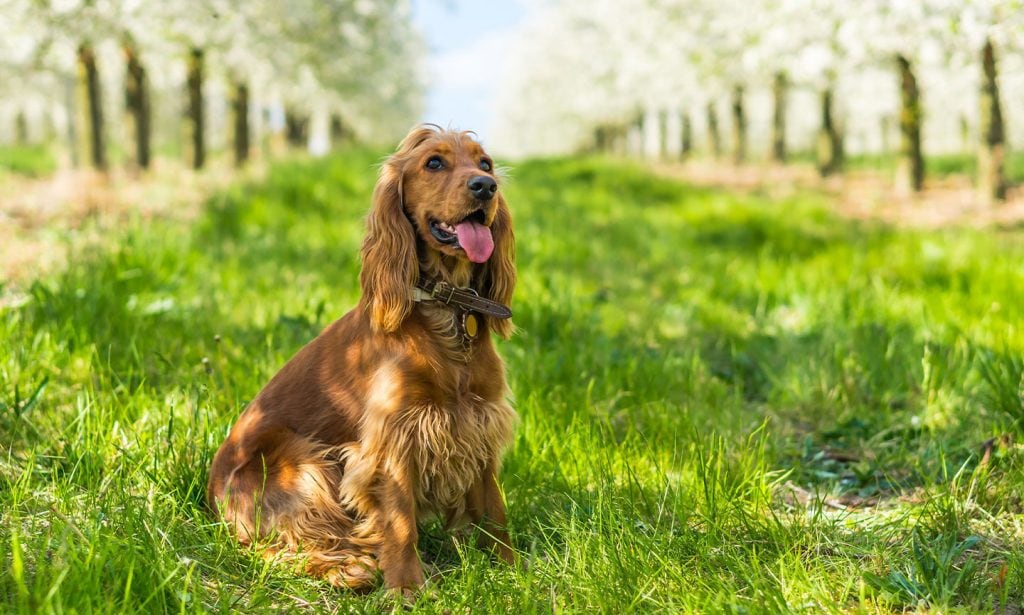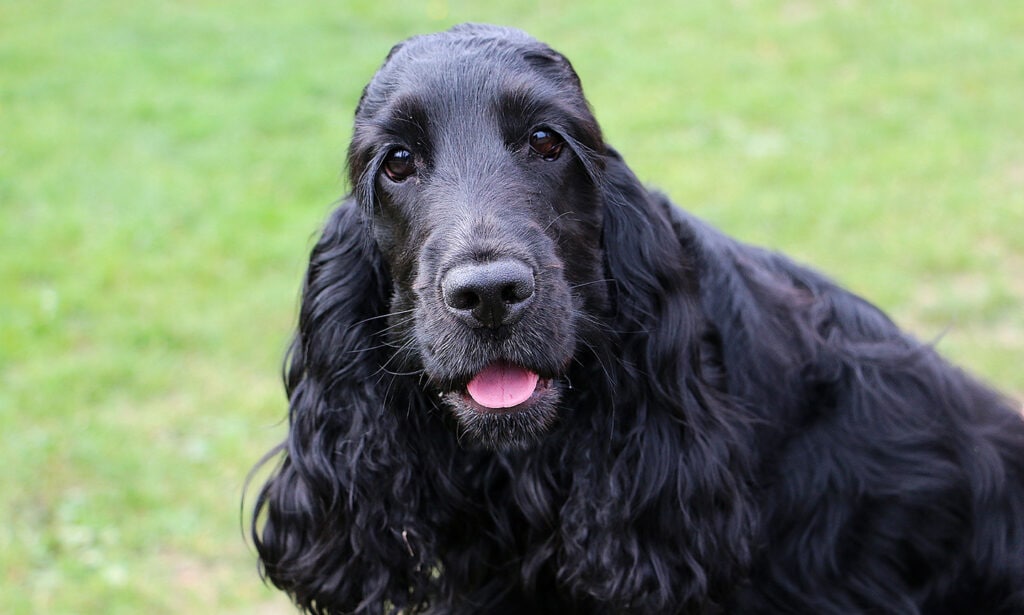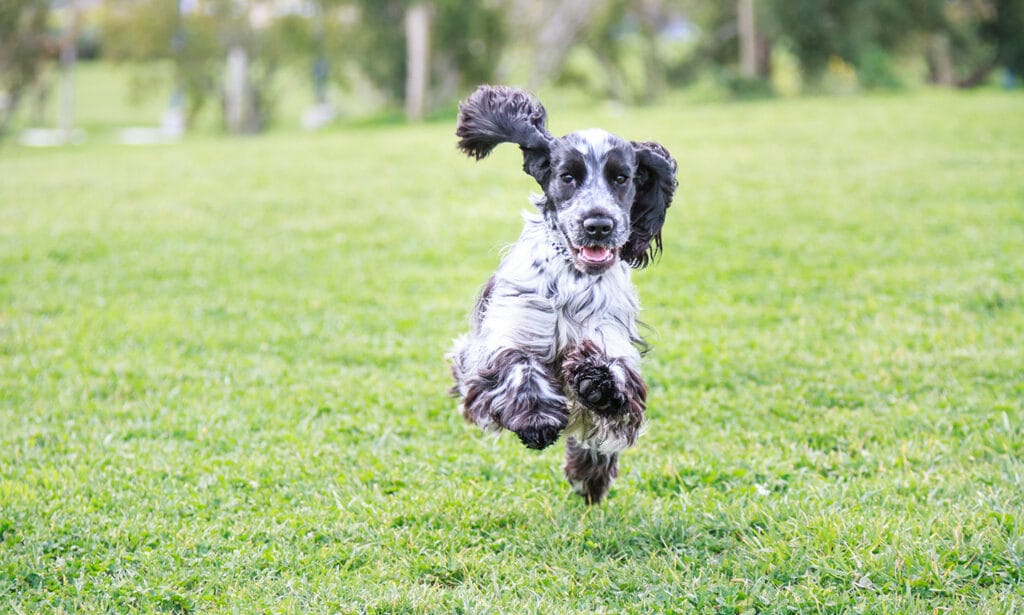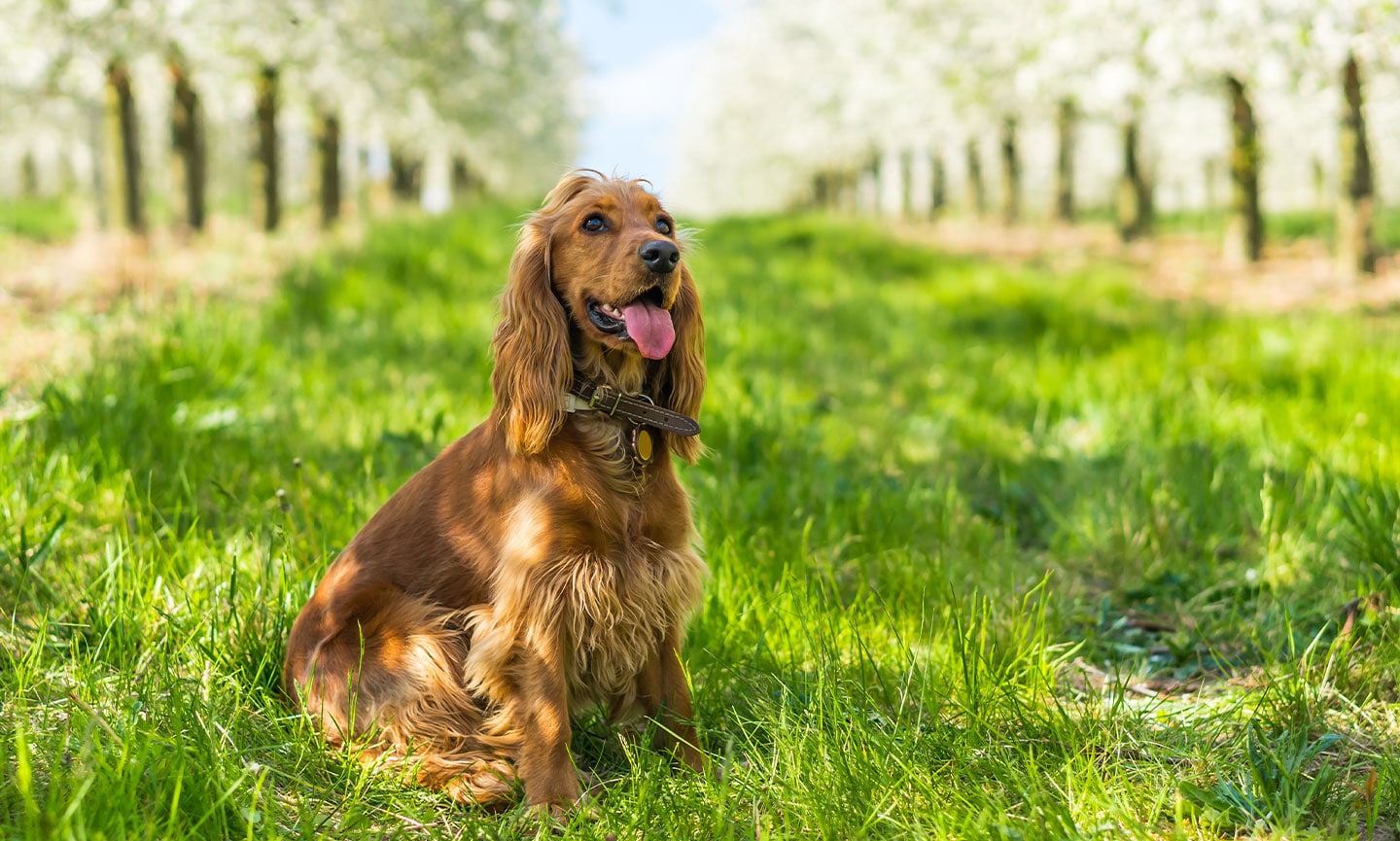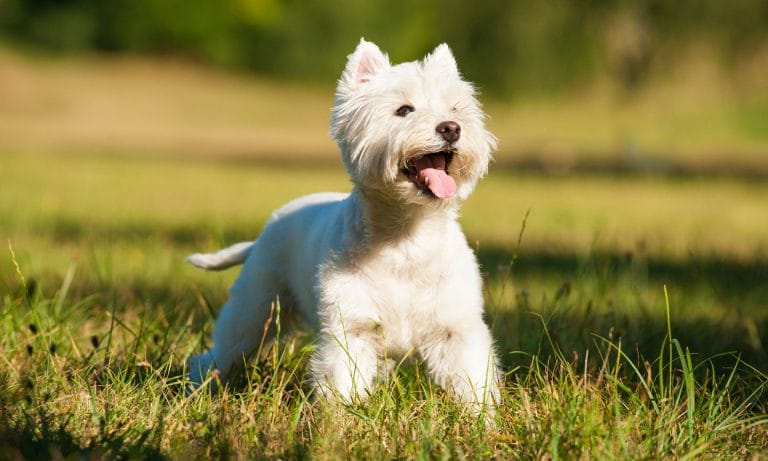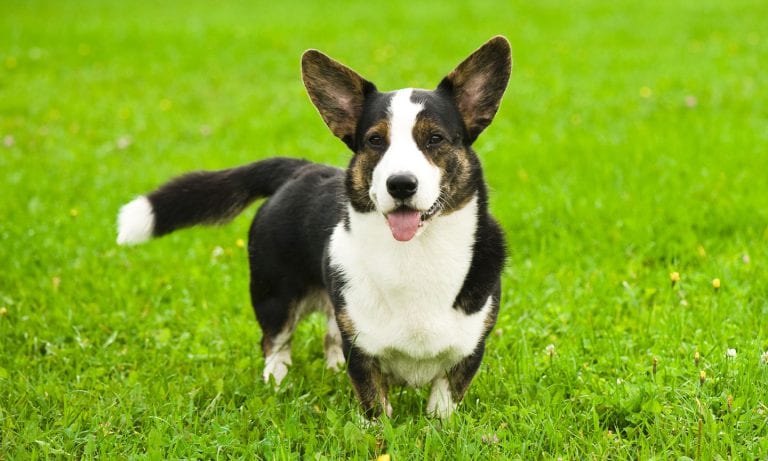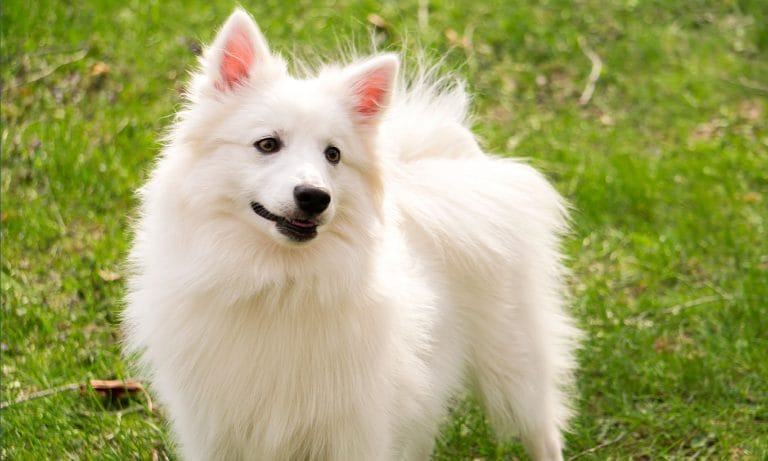With an English Cocker Spaniel, your days will be merry and bright. Joyful times await an English Cocker Spaniel pet parent, as this affectionate dog gets along well with just about everyone—two- and four-legged friends alike. They’re super intelligent and eager to please, making training sessions a snap. And they’re at home just about anywhere, so long as regular promenades are on the schedule. Why? All the better to show off their lustrous fur coats and long ears that swish-swish (you can almost hear it!) when they walk.
Breed Snapshot
Temperament:
PeppyAffectionateFaithfulCoat Color:
BlackBlack And WhiteBlue RoanBlue Roan And TanLiver Roan And TanLiver RoanOrange And WhiteOrange RoadRedBlack And TanBlack White And TanLiveLiver And TanLiver And WhiteLiver White And TanRed RoanGoldenLemon Roan
Best For
Playful and energetic, English Cocker Spaniels thrive on mental stimulation and exercise. Their cheerful temperament makes them ideal companions for active families who can provide lots of love and regular grooming and training.
English Cocker Spaniel Temperament
The English Cocker Spaniel’s temperament is delightful—this little pup is eager to learn and please. With a playful personality and loads of smarts, an English Cocker pup gets along well with other dogs in the home and can even mix with cats.
Sweet English Cocker Spaniels are great with kids and are not huge barkers, so they’re easy to have in small homes and apartments. Your neighbor won’t bang on the wall to complain. Instead, she’ll ask to come over and pet your pretty pooch!
Still, as with all dogs, early socialization is a must. If you start early, you’ll get your pup used to their new environment, which means they’ll react in a friendly way in unfamiliar situations, with strangers and other canines. The English Cocker Spaniel puppy is typically easy to train since they’re motivated to please and intelligent.
A member of the Sporting group of dogs, the English Cocker Spaniel worked alongside bird hunters to flush game from dense underbrush. So, playing fetch in the backyard is a walk in the park for this energetic animal. First-time pet parents won’t struggle much to teach and train their English Cocker Spaniel puppy—their can-do attitude makes learning a pleasure.
How to Care for a English Cocker Spaniel
The English Cocker Spaniel breed is one high-maintenance pooch, and they’re worth it. Their coat will lead you down the brush and comb aisle at the pet store in order to maintain their luscious locks. And they also need a lot of exercise. But this gives you ample time to bond with your loving and adorable pup.
English Cocker Spaniel Health
English Cocker Spaniels have a lifespan of 12 to 14 years, but as with any breed, they’re prone to some health issues. Some are genetic, and responsible breeders will perform genetic screening testing when possible.
- Ear Infections: Because the English Cocker’s ears are so long and floppy, they may drag and collect dirt and debris, which could lead to an infection. Check the ears weekly and note any signs of pain, such as whining, head shaking, odor, or crustiness. Your vet may prescribe a special ear cleanser and/or topical or oral medication to treat the infection.
- Hip Dysplasia: This genetic condition is a malformation of the hip joint that occurs when the hip ball doesn’t sit well in the socket. Lameness and pain may be apparent; treatment can range from medications to surgery.
- Patellar Luxation: A kneecap that slips or “floats” rather than sits snugly in the joint is called patellar luxation, and it may cause your pup to limp or hold the leg up when walking. A vet may prescribe medication, but some dogs may need surgery.
- Progressive Retinal Atrophy (PRA): This eye condition may develop in English Cocker Spaniels, leading the retina to degrade, causing blindness. While there’s currently no cure, many dogs adjust well to sight loss. A genetic screening test is available, so be sure to ask your breeder.
- Kidney Failure: Also known as familial nephropathy, this congenital malformation prevents the kidneys from excreting waste, causing your dog to exhibit increased thirst, weight loss, poor appetite and vomiting. While no cure is available, genetic screening testing is available.
- Adult Onset Neuropathy: AON, a hereditary disorder, is a type of progressive weakness and may lead your pup to have trouble walking. This condition has no cure, but genetic screening testing is available.
English Cocker Spaniel History
As some of the oldest dogs in the American Kennel Club’s Sporting group, spaniels, along with setters, pointers, and retrievers, were bred to assist bird hunters, primarily those hunting grouse and woodcock. The English Cocker Spaniel’s history originated in England and was developed hundreds of years ago from dogs with Spanish roots—hence the name “spaniel,” which comes from the word “Spanish.”
Each of the various spaniel types had their own role to perform during the bird hunt, including water and land spaniels, springer spaniels, and field spaniels. English Springer Spaniels and Cocker Spaniels were originally the same dog. Springers were the larger pups of the litter and were used to spring (flush) birds from the brush. The English Cocker Spaniels were the smaller pups of the litter, and their mission was to flush out woodcock, a quail-like bird, from its hiding place in dense thickets.
In the early 20th century, American breeders decided to create their own Cocker Spaniel, albeit a smaller one with a rounded, shorter head and a more lavish coat. In 1946, the AKC recognized the American Cocker Spaniel and the English Cocker as separate breeds.
Today’s English Cocker has left birding behind and lives the good life as a popular family pet. The AKC lists breeder information if you’d like to purchase an English Cocker Spaniel breed. English Cocker Spaniel puppy prices typically run between $1,200 and $1,500. But for that price, you’re likely getting a pup who’s been screened for health and temperament issues and may come with pedigree papers. You can also contact the English Cocker Spaniel Club of America for information on rescuing a pup, watch for the breed at your local shelter, or search Chewy’s database of adoptable dogs in your area.
FAQs
What is the difference between English and American Cocker Spaniels?
The difference between the English Cocker Spaniel and the American Cocker Spaniel comes down to their size, head shape and the amount of fur they have. American Cockers were developed as a smaller companion to the English dog breed with a shorter head, a rounded skull and a more abundant coat. In 1946, the AKC recognized English and American Cockers as separate breeds.
How long do English Cocker Spaniels live?
English Cocker Spaniels live, on average, between 12 and 14 years, which means a puppy can grow up to become a faithful pal for your children from kindergarten through high school.
Are English Cocker Spaniels good family dogs?
Yes, the English Cocker Spaniel makes a wonderful family pet, especially if they’re socialized early. As an easy-to-train breed, this canine cutie is also quite friendly and gets along well with children and other animals in the home.
Do English Cocker Spaniels bark a lot?
An English Cocker Spaniel’s barking level is moderate—so this pup won’t be the loudest in the dog run. Still, every animal lets out a yip or three when startled or excited, so stick to consistent training to modulate your English Cocker’s barking tendency.
Do English Cocker Spaniels shed?
Yes, English Cocker Spaniels shed a lot. With such a profuse coat comes a high level of shedding, so be ready to brush your English Cocker Spaniel every week or more to maintain the glossy sheen and remove knots and matted fur.
What are the most common English Cocker Spaniel mixes?
- >English Cocker Spaniel-Poodle mix
- English Cocker Spaniel-Golden Retriever mix
- English Cocker Spaniel-Labrador mix
Note: These are not purebred dogs but mixed breeds.

Top Takeaways
Living with an English Cocker Spaniel can be a rewarding experience. These affectionate, friendly and playful dogs make great family pets for both new and experienced pet parents.
Expert input provided by veterinarian Stephanie Liff, DVM, of Pure Paws Veterinary Care in New York City and Russell Harstein, certified dog behavior consultant and trainer in Los Angeles and founder of Fun Paw Care.
Breed characteristic ratings provided by veterinarian Dr. Sarah J. Wooten, DVM, CVJ, a veterinarian at Sheep Draw Veterinary Hospital in Greeley, Colorado; dog trainer and behavior consultant Irith Bloom, CPDT-KSA, CBCC-KA, CDBC, owner of The Sophisticated Dog, LLC, in Los Angeles; and certified animal behavior consultant Amy Shojai, CABC, in Sherman, Texas.
The health content was medically reviewed by Chewy vets.

Search for Adoptable English Cocker Spaniels Near You
Top English Cocker Spaniel Names
These are the top English Cocker Spaniel names as chosen by Chewy's pet parents!
Female Names
- Lady
- Daisy
- Maggie
- Lucy
- Luna
- Ruby
- Sadie
- Molly
- Bella
- Millie
Male Names
- Cooper
- Oliver
- Scout
- Charlie
- Bentley
- Winston
- Henry
- Murphy
- Louie
- Tucker
Share:
